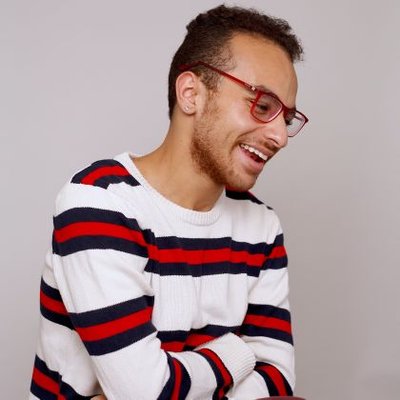
Golden Thread Productions received 113 submissions from around the world for this year’s iteration of its signature biennial program, The ReOrient Festival of Short Plays, running at Potrero Stage through November 4. Just half a dozen made the final cut.
And three of the selected shows are by queer and nonbinary playwrights with a focus on queer characters.
Given that Golden Thread is first and foremost dedicated to developing and presenting plays about the Middle East and its diaspora, this year’s line-up serves a strong reminder of the intersectional nature of identity.
It should also serve as an extra push for theatergoers in the Bay Area queer community who have never been to a Golden Thread show to give the company a look.
For nearly 30 years, Golden Thread has been presenting what its guiding principles describe as “socially conscious works with a progressive political sensibility.”
In this critic’s experience as a non-Middle Easterner and frequent playgoer, their productions have been among our region’s strongest showcases of new work, period.
I recently chatted with the queer playwrights whose work is featured in this year’s festival.

Adam Elsayigh
Adam Elsayigh’s full length “Drowning in Cairo,” a complex exploration of class and homophobia in Egypt, had its world premiere at Golden Thread in 2022. The Cairo-born playwright returns with “Data Queen,” set in San Francisco.
“It’s about an intergenerational gay couple that starts to have trouble after they open their relationship,” he explained.
It’s not hard to guess what issues might emerge in this surprisingly funny, sexually frank piece, but you’d likely guess wrong.
“The younger man is an Arab immigrant in his 20s and his partner is a white man in his 50s. The conflict within their relationship doesn’t come from any feelings they have about their age difference at all,” said Elsayigh, “They’re genuinely fine with that. The problems have to do with the assumptions other people make about what intimacy must be like for them, given their races and their ages.”

Arti Ishak
“Closure,” Arti Ishak‘s taut two-character drama, began with a workshop prompt at the Chicago Muslim writers’ collective they participate in. While the biracial, non-binary Ishak has long worked as an actress, stage director and filmmaker, this is their first play.
“The theme they gave us to write about was ‘On Mute'” said Ishak. “And I immediately thought about how I felt placed on mute when I was being bullied in middle school,” recalled Ishak. “I started to wonder what it would be like to re-encounter my bully as an adult.”
A friend who admired the resulting script and had seen Golden Thread’s call for submissions urged Ishak to send in their work.
How did it feel to have such a personal story interpreted by others, especially given that Ishak is a performer (They won’t make the play’s premiere because they’re covering a lead role at the Steppenwolf Theatre).
“It’s semi-autobiographical,” said Ishak, “but I think the second you start to put something to paper, it takes on its own life. And the actors brought a whole other dimension to it. These actors were so collaborative and asked so many good questions. I told them I wanted the dialogue to be tight and snappy, and to tell me if there were lines that felt uncomfortable in their mouths. They really helped to streamline the play and sharpen the characters.”

Hamed Sinno
As lead singer of the Lebanese indie rock band Mashrou’ Leila, artist-activist Hamed Sinno, who identifies as gay and non-binary, achieved enormous popularity throughout the Middle East. The band drew huge crowds and appeared on the cover of the regional edition of Rolling Stone.
But as an openly gay public figure, Sinno faced harassment and threats alongside the adoration of queer fans.
After a Pride flag was flown at a 2017 Cairo concert by the band, the police arrested several audience members, one of whom, after a traumatic incarceration, committed suicide.
“I started to have a lot of cognitive dissonance,” he said, regarding the decision to disband Mashrou’ Leila in 2022, after which he enrolled in graduate school.
His one-act, “The Suicide Bomber,” is a dizzyingly meta work that veers between comedy and tragedy. It has a playwright as its central character, a lengthy passage about military atrocities in the Middle East delivered in rhyming verse, and a queer dancer described in script notes as “someone whose self-worth comes from feeling useful to the world.”
Sinno says that watching from the wings as other performers bring his words to life “is really hard, because I’m a control freak. When I’m on stage as a singer, if there’s a problem, part of me feels like I can fix things in the moment. So, this can be nerve-wracking.”
He better get used to it. Sinno has been commissioned to develop a piece for the Metropolitan Opera.
